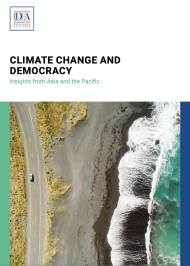
Democracy is on trial in the climate crisis. It is charged with having failed to prevent dangerous climate change. To its critics, the very same features of democracy praised as its defining virtues—popular sovereignty, the accountability and responsiveness of elected officials, public debate and deliberation—are handicaps that impede effective climate action. However, this trial is not over and it would not be safe to deliver a verdict at this stage. The case for authoritarian regimes is flawed in both theory and practice and while it is late for preventing the worst impacts of climate change, there is still a window to provide a climate-safe future. Here, it is overwhelmingly democratic nations that are taking the lead.
With this in mind, this Report focuses on democracy and the climate crisis in the Asia and the Pacific region. A regional approach based on case studies has been chosen to contextualize the challenges to democracy arising from this crisis. The Asia and the Pacific region is significant for several reasons—it is the most populous in the world; it is a region that will be disproportionately affected by climate change and where many countries are considered highly vulnerable; and, as this Report makes clear, it is also a place where there have been vibrant innovations to democratic institutions and practices for dealing with the climate crisis.




